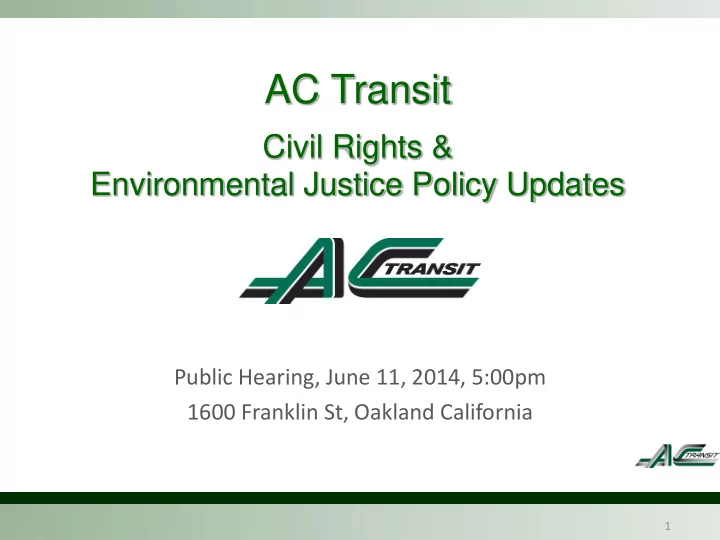

AC Transit Civil Rights & Environmental Justice Policy Updates Public Hearing, June 11, 2014, 5:00pm 1600 Franklin St, Oakland California 6/2/2014 6/2/2014 1 1 6/2/2014 1 1 1
TITLE VI of the Civil Rights Act bars discrimination on the basis of race, color, or national origin in programs and activities by organizations that receive federal funding, such as AC Transit. Environmental Justice includes barring discrimination on other bases, such as income status 6/2/2014 2 2
AC Transit’s Service Area 70% Minority 29% Low Income 19% Limited Proficiency in English 6/2/2014 3 3
5 Changes • Our Complaint Process • How we define a “Major Service Change” • How we measure the impacts of changes on communities of color • How we measure the impacts of changes on low-income communities • How we assess bus service 6/2/2014 4 4
Title VI Complaint Process PROPOSED CHANGES: • Add low-income status • Add the ability to make a complaint and receive a response in languages other than English • Add deadlines and timelines for prompt response and/or action • Consolidate language into one policy • Changes reflect current practice – updated last year 6/2/2014 5 5
Major Service Change Policy What is a Major Service Change? • A new route • Service on streets without previous transit • 10% or more change of transit miles or hours system-wide • 20% or more change of transit miles or hours in one of District’s planning areas (West Contra Costa County; North, Central, South Alameda County) • 25% or more change of transit miles or hours of an individual route • If cumulative effect of changes over 3 years results in a Major Change – treat as such 6/2/2014 6 6
Disparate Impact Policy Measuring the Impact to Communities of Color Proposed Policy: “When the proportion of minority populations or riders adversely affected by the proposals is 15% or more than the proportion of non- minority populations or riders adversely affected, such changes will be considered to have a disparate impact.” 6/2/2014 7 7
Disproportionate Burden Policy Measuring the Impact to Low-Income Communities Proposed Policy: “When the proportion of low-income populations or riders adversely affected by the proposals is 15% or more than the proportion of non-low-income populations or riders adversely affected, such changes will be considered to have a disproportionate burden .” 6/2/2014 8 8
What happens if we find there IS a potential discriminatory effect? – AVOID – MINIMIZE – MITIGATE 6/2/2014 9 9
Transit Service Monitoring Proposed Policy: • Monitor and report on the required service standards and service policies not less than every three years • Look for and remedy patterns of discrimination in service planning and operation 6/2/2014 10 10
Questions? Thank You! 6/2/2014 6/2/2014 11 11 6/2/2014 11 11 11
Recommend
More recommend